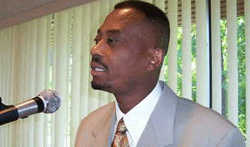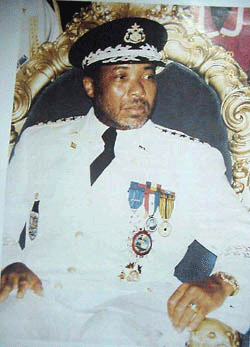
October 8, 2003
 |
|
Robert Sayon Morris
|

October 8, 2003
 |
|
Robert Sayon Morris
|
 |
|
Charles Taylor
|
Hundreds killed
During the two months of fighting, more than 1000 people were killed, hundreds
of people got wounded, thousands of citizens were internally displaced and
millions of dollars worth of properties destroyed.
Was Taylor's departure from Liberia voluntary? NO! He had decided to
"fight to the end." In one of his addresses to the Liberian people,
he indicated that his "army would fight until the last soldier is killed."
Taylor's mandatory exodus was also due to international pressure from
the United States, the Economic Community of West African States (ECOWAS)
and calls from Liberians abroad.
President George Bush
The President of the United States, Mr. George Bush, concerned about the carnage in Liberia, commanded Taylor: "Resign and go into exile." Under pressure, Taylor heeded the command of president Bush to step down from power to avert further bloodbath in Liberia.
ECOWAS leaders dispatched representatives to Liberia and urged Taylor to relinquish
power and leave the country.
Asylum in Nigeria
The President of Nigeria, Olusegun Obasanjo, traveled to Liberia and offered
Taylor asylum. He said Taylor and his family were welcome to live in Nigeria.
Taylor accepted the offer.
Alarmed by their country's quandary, Liberians in the US demonstrated
in various states and at the US Capitol as well as at the United Nations Headquarters
in New York to call attention to the massacre in Liberia and for Taylor to
leave the country. They also granted numerous interviews to media institutions,
including CNN, ABC, BBC, etc.
A former corrupt civil servant
Charles Taylor, a corrupt former civil servant under President Samuel Kanyon
Doe, began his rebel incursion into Liberia from the Ivory Coast on December
24, 1989.
He was born from an Americo-Liberian father and a Golah Mother. Taylor had broken out of a United States jail after Doe had accused him of embezzlement.
The "Papay", as he is commonly called, was head of the National
Patriotic Front of Liberia (NPFL). This dissident group was mainly composed
of Americo-Liberians and Mano and Gio people. Their mission: to oust President
Samuel Kanyon Doe, seize state power and steal the nation's wealth.
"Freedom Fighters"
When the NPFL fighters entered Liberia, they called themselves "Freedom
Fighters". Not knowing their real intention, many Liberians embraced
them but it was not long that they discovered that the NPFL fighters were
"wolves in sheep's clothing". The so-called "Freedom
Fighters" later became known as "Killers" for their diabolical
acts.
While on a visit to ECOMOG headquarters at the Free Port of Monrovia, Samuel Doe was captured on September 9, 1990 by Prince Yormie Johnson of the Independent National Patriotic Front of Liberia (INPFL), a break away group from the NPFL. Doe was tortured, mutilated and killed by Johnson and his band of hooligans.
NPLF atrocities
Between 1989 and 1997 Taylor's NPFL exhibited one of the most disturbing
horror shows the world has ever seen. Approximately 200,000 Liberians were
murdered, thousands were mutilated and thousands of women and girls were raped.
Some of the atrocities committed by the NPFL still linger in the minds
of people today:
NPFL fighters used knives to open the stomachs of pregnant women, extracted the babies and killed them. They then allowed the women to bleed to death. NPFL fighters beheaded civilians for simply being a Krahn, a Mandingo or government worker or official.
In some cases the NPFL killers tied the hands and legs of civilians and threw them into rivers or dugout wells to drown.
In many areas town and villages were set ablaze if residents were suspected
of collaborating with the enemy.
NPFL executed hundreds of nationals from Nigeria, Ghana, Sierra Leone, The
Gambia, Mali and Guinea simply because these countries had contributed troops
to ECOMOG.
They killed religious people, including five American catholic nuns at their
residence in Gardnersville, a suburb of Monrovia.
The bodies of slaughtered civilians were used by the NPFL fighters to block
roads. They also used the heads and skulls of murdered civilians on their
vehicles for display. At various checkpoints, they displayed skulls of civilians
they had killed.
In Nimba County in 1989, NPFL fighters entered a mosque and killed all who
had taken refuge there.
NPFL fighter massacred over 250 civilians in the general Harbel area, about
64km from Monrovia.
Harassment, vulgarity, intimidation, killings, rape, intoxication (drugs
and alcohol), stealing, looting, detention, vandalism, random shooting in
the air and other vices were the order of the day in Taylor's territory.
Executions of Nimba County Elite
Most of those who fought for the NPFL were from the Gio and Mano ethnic groups.
They were die-hard supporters of Mr. Taylor but "Ghanky" showed
no respect for the sanctity of human life. He ordered the executions of many
educated Gio and Mano men. Some of those killed include Sam Saye Dokie, Jackson
F. Doe, Associate Justice J. Patrick K. Biddle and Superintendent Stephen
Daniels.
Others are former Commerce Minister David Dwayan, Counselor Alfred Flomo,
Cooper Teah and G. Moses K. Duopo. These people were highly respected and
held outstanding positions in Liberia. Their executions brought tears to the
eyes of thousands of Liberians. It is sad to say that Taylor has never apologized
to the people of Nimba County for his horrific act.
"You killed my Ma, you killed my Pa, I'll vote for you."
After years of fighting, Taylor participated in the general and presidential
elections and "won" in July 1997. The Liberian people elected
him out of fear. They were apprehensive that had he not won the election he
would have returned to the bushes with his thugs to begin a new war.
During the election, many Liberians sang: "You killed my Ma, you killed
my Pa, I'll vote for you." They did vote for Charlie and taught he would
have given them "milk and honey" and would have transformed the
war-ravaged country into a paradise. During his inauguration, Taylor pledged
to "uphold and defend the Liberian Constitution." However, his
assurance was only a sham.
Press Freedom
The Constitution guarantees press freedom and freedom of expression but the
press suffered constant abuse and censorship during the Taylor regime. Scores
of journalists were arrested, tortured and jailed. Many fled into exile in
order to stay alive. State security officers vandalized media institutions.
Newspapers and radio stations, including Star Radio were constantly closed
down.
Taylor's regime also ordered the arrest of four journalists from the
British Television, Channel 4, in August 2000 on "espionage charge".
The government's action was intended to muzzle the press and make Taylor
a King.
Charles Taylor used violence to silence independent voices speaking out about Liberia's deteriorating human rights record. It can be recalled that one of Liberia's most outstanding human rights lawyers, Tiawan Gongloe, was arrested and brutalized in police custody. He was hospitalized as a result. Counselor Gongloe is presently in the United States.
Charles Taylor
| December 24, 1989 | Launched rebellion |
| July 1997 | Won elections |
| June 2003 | Indicted for war crimes |
| August 2003 | Resigned |
During Taylor's regime, Liberian civil servants experienced great hardship.
They were not paid for 15 months and were expected to be at work daily.
There were no electricity and piped borne water. Government medical institutions
lack medications and qualified doctors. Public schools had no logistics. Students
sat on blocks in schools to learn.
Taylor's securities terrorized the citizens. People were afraid to travel
at night. There were checkpoints all over the country. Citizens who were vocal
against the government's bad policies disappeared without trace.
The former Vice President, Enoch Dogolea did not escape the wrath of Mr. Taylor, his boss. Taylor allegedly ordered the flogging of Mr. Dogolea in 2000. Dogolea died in the Ivory Coast a few days later, where he was sent for medical treatment. The Liberian public was outraged when he heard of the Vice President's death. As usual, Taylor threatened to "deal" with anyone who pointed accusing fingers at him. "Even if it (that he killed his Vice President) is said in a taxi, all occupants of such a taxi including the driver will be dealt with," he added, according to AFP quoting Taylor.
Conclusion
There is a Liberian parable, which says: "Every rope in the bush has
an end." Fourteen years seems to have been a long time but it had an
end. The regime of Charles Taylor has ended. Liberians are happy that their
demon has finally left the country, thus bringing to an end 14 years of civil
war.
A new interim government has been formed, headed by Mr. Gyude Bryant, a 54-year-old
Monrovia businessman. Warring factions, political parties and civic groups
have all agreed to work with Mr. Bryant. It is hoped that the Interim Government
would set the stage for reconciliation, peace, development and general and
presidential elections.